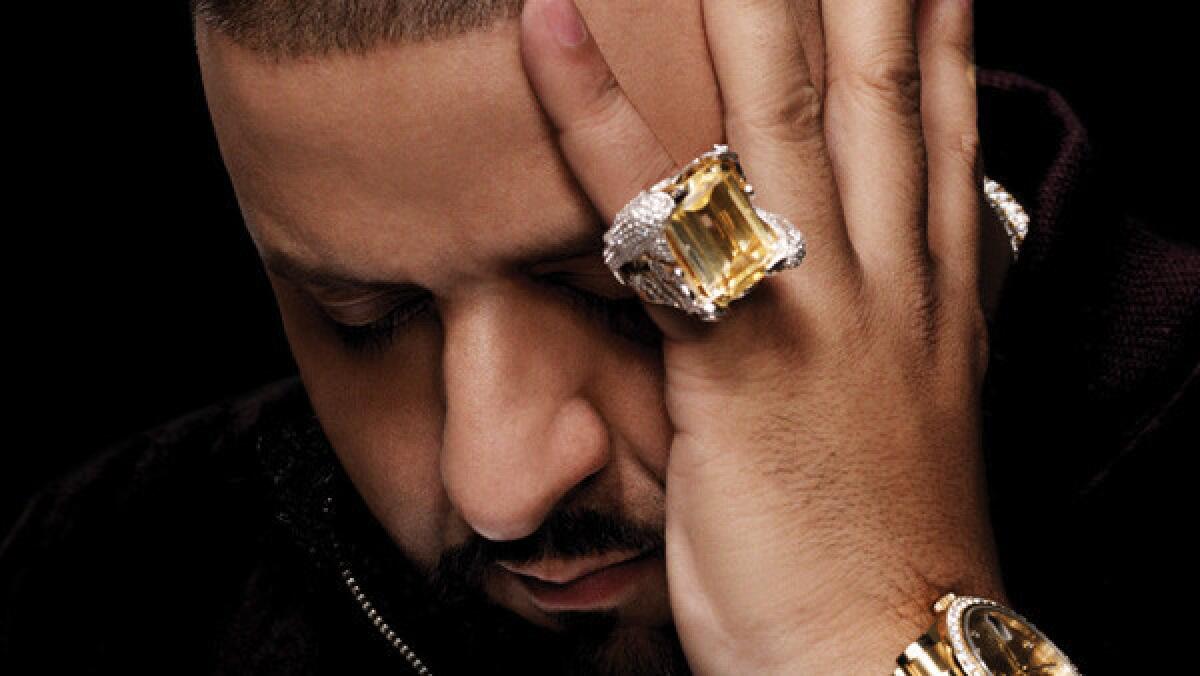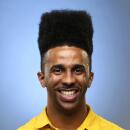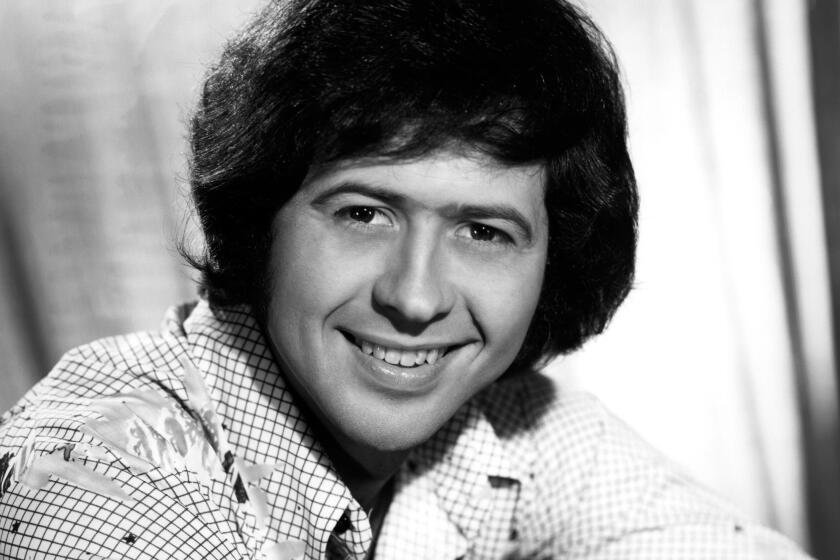DJ Khaled holds a major key to American prosperity

- Share via
DJ Khaled is the Internet philosopher we all need right now.
If you’re late to the game, DJ Khaled is a Top 40 hip-hop artist who, until a few months ago, was mostly recognized for yelling his own name in songs like “All I Do Is Win.” But now, he’s attracted an entirely new set of fans, thanks to his bizarre Snapchat account. Every day, you can watch Khaled eat breakfast, water his plants and deliver 10-second sermons on the keys to success.
He’s got an entire set of catchphrases: “another one,” “you played yourself,” “major key.” At this point, he should probably just copyright the “key” emoji.
But the masterpiece of his Snapchat phraseology is “they,” as in “they don’t want you to have breakfast.” He says this every morning.
Khaled never says who “they” is, or what “they” have against you eating your egg whites, but that’s what makes the statement so useful. We all have a “they,” don’t we? “They” is anyone who gets in your path. “They” are the doubters. The naysayers. The people that Notorious B.I.G. was talking about in the intro to “Juicy.”
Khaled has managed to turn schadenfreude into a fill-in-the-blank springboard for motivating yourself.
When he says, “They don’t want you to eat breakfast,” he’s simultaneously telling you: “Eat your breakfast, so that you can have revenge on your haters,” and: “You’ve worked hard and achieved success, and your breakfast is a reward for that. Enjoy that reward, so that you can have energy to work more.”
Khaled’s anti-“they” mantra is a motivational anthem for late capitalism: Defeat the competition. Make money. And then with that money, go make more money. Rinse and repeat.
They don’t want you to rinse and repeat.
Khaled’s “virality” might seem odd, until you realize that Khaled is basically the rap game Tony Robbins. (Hell, Tony Robbins has a video called “2 Keys to Success.” Bless up.)
Robbins is one of the kings of motivational speaking, but he fails in one aspect that Khaled delivers: theatrical range. Only Khaled can merge feel-good American ambition with the macho braggadocio of hip-hop – and still temper it with the rawness of the human experience.
Prime example: In October, Khaled sat down for a video interview with Complex. When asked if he’d ever caught an “L” – that is, if he’d ever made a big mistake – Khaled looked horrified, like he’d been asked about the last time he kicked a puppy. “Never in my life,” he said.
“You’ve never, like, missed a highway exit or something?” the interviewer asked, incredulously.
“Nah.”
Six weeks later, Khaled caught a very large “L.” On Dec. 15, he got lost at sea while riding his Jet Ski at night. He started panicking, and sent out a flurry of Snapchats, each one more desperate than the last. By the end, there was no text – just a “prayer hands” emoji superimposed over video of him driving around, looking for the shore.
Millions of people watched this drama unfold, and many probably came to the inevitable conclusion that DJ Khaled is a hypocrite. He is, but he’s a vulnerable, lovable hypocrite, one who is willing to bare himself to the world during his darkest hour. He won’t admit weakness verbally, but he’s happy to show it to you.
Khaled has joined one of his frequent collaborators, Drake, in the hallowed circle of rap dudes who know how to capitalize on an Internet joke (Xzibit sits far outside this circle). Drake is the king of this stuff: He actively courts Internet funnies, treating them as user generated content for his own brand. He knew ahead of time that his “Hotline Bling” video was going to get memed.
Drake’s online persona is too carefully crafted to feel truly welcoming, though. When he started hitting the gym, we didn’t know until he started Instagramming carefully angled pictures of his pectoral muscles. Drake shows us only results – never the process. He went from Degrassi to “Daddy,” leaving NY Mag to ask the question on everyone’s minds: When exactly did Drake get so swoll?
DJ Khaled won’t hide the struggle. He invites you into the process of transformation, and reminds you that it’s OK to love your body as it is. He brings us into his gym, sweating and out of breath, as he shouts encouraging mantras – to himself, to you, to the universe.
When we watch DJ Khaled sweating on that elliptical, we’re watching Daniel-san “wax on, wax off.” We’re watching Jackie Chan lift buckets of water in “Drunken Master.” We’re watching Rocky Balboa run up the steps of the Philadelphia Museum of Art.
A New York Times piece noted that DJ Khaled never Snapchats himself working, which is true only if you consider “work” in the narrow sense of Khaled’s job – a DJ and entrepreneur. But if you consider “work” to be anything that makes you better as a person, then, my friend, you are watching some work.
In the best sense of the word, Khaled is probably the most American thing we’ve got going for us right now. Seriously: He’s a New Orleans-born child of Palestinian immigrants who idolizes Jamaican reggae singers and got his break in a hip-hop crew fronted by a Puerto Rican.
He embraces diversity in every aspect of his life. When he talks about his favorite food, he gives equal respect to Cinnamon Toast Crunch and his mother’s maqluba (an Arabic dish with rice and lamb). He doesn’t talk much about his faith as a Muslim, but he doesn’t hide it, or his own shortcomings. He prays 10 times a day. When Larry King pressed him on his religion, he said, “I practice it, but I could do a better job.”
And he’s a true capitalist, and a champion of new media marketing. He works the hustle from both ends: creating viral in-jokes that risk being co-opted by large corporations, then beating them to the punch by co-opting them himself, using his celebrity power to sell merchandise.
But when he tells you to enjoy the sunshine, or to listen to the music of bamboo plants in the wind, he’s a much-needed counterweight to hip-hop’s tendency to over-glamorize hard work (see Yo Gotti, who told us on “Full-Time” that “real hustlers don’t need no sleep”).
Not all heroes wear capes. Some wear “Another One” sandals, so that we can recognize them as one of our own.
And we can recognize ourselves in DJ Khaled, reminding us at every step of the way to never, ever play ourselves.
Follow me @dexdigi for more on the pathway to more success.
The biggest entertainment stories
Get our big stories about Hollywood, film, television, music, arts, culture and more right in your inbox as soon as they publish.
You may occasionally receive promotional content from the Los Angeles Times.








